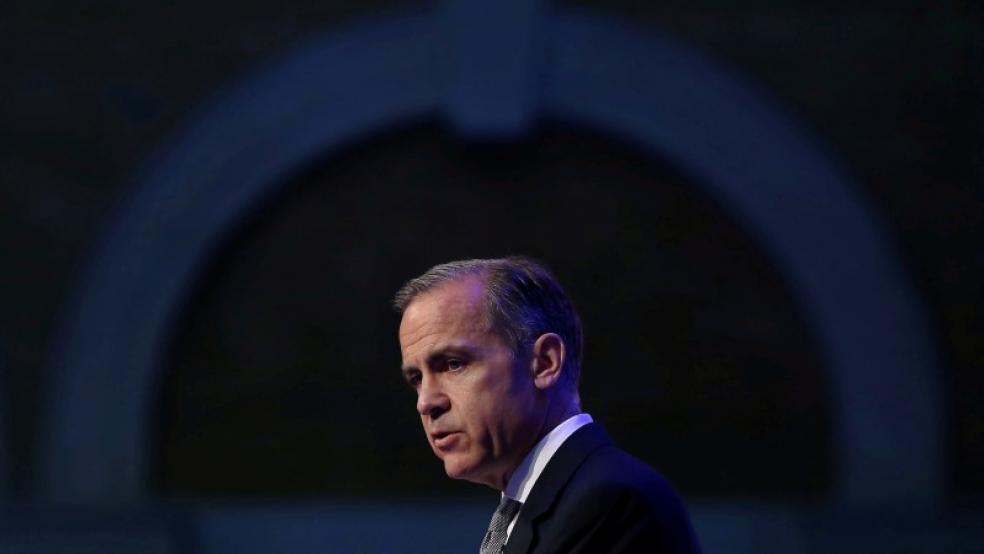LONDON (Reuters) - The Bank of England scrapped plans to cut interest rates and said they could move in either direction as it ramped up its forecasts for growth and inflation in 2017 following sterling's slide after the Brexit vote.
Sterling rose and British government bond prices fell sharply as the BoE shifted to a neutral stance on what its next move on interest rates would be.The central bank, which has come under heavy political criticism for its near-zero rates, sharply adjusted its view of when Britain's economy will feel the pain of June's referendum decision to leave the European Union. In a set of quarterly forecasts published on Thursday, it predicted less of a short-term impact but warned that Britain's access to EU markets could be "materially reduced" which would hurt growth over "a protracted period".The BoE responded to the Brexit vote by cutting interest rates to record low of 0.25 percent in August and restarted its massive bond-buying program for the first time since 2012.It said then that another rate cut was likely this year. But on Thursday it shifted to a neutral position as it predicted a record overshoot of inflation above its target following sterling's fall to a 31-year low against the U.S. dollar."There are limits to the extent to which above-target inflation can be tolerated," the BoE's Monetary Policy Committee said in a statement as it forecast inflation would jump to 2.7 percent this time next year, nearly triple its current level.Inflation was only expected to return to 2 percent in 2020."Monetary policy can respond, in either direction, to changes in the economic outlook as they unfold to ensure a sustainable return of inflation to the 2 percent target."Thursday's change in stance could please Prime Minister Theresa May, who said last month that the BoE's ultra-loose monetary policy had "bad side effects" for savers.BoE Governor Mark Carney - who said on Monday that he would stay at the BoE for an extra year until June 2019 - will be keen to dispel any suggestion that May's views influenced the BoE's decision when he holds a news conference at 1230 GMT.Last month he said he would not "take instruction" from politicians on how to meet the Bank's inflation target.Philip Shaw, an economist with Investec, said the change in stance on interest rates appeared designed to dampen concerns in markets about rising inflation, which has pushed down government bond prices, rather than signal that a rate hike was on the way."It's more of a statement to soothe inflation expectations, especially given the steeper yield curve that has been evident over the past few weeks," Shaw said.UNANIMITY ON RATES, QEThe BoE's policymakers voted 9-0 at their November meeting to keep rates on hold at 0.25 percent, the BoE said on Thursday, in line with economists' expectations in a Reuters poll.There was also unanimous support to stick with August's plans to buy a total 435 billion pounds of government debt and 10 billion pounds of corporate bonds. Sterling hit its 31-year low against the dollar last month, shortly after May suggested she might adopt a tough approach for negotiations with the EU, potentially limiting British exports.The BoE said the impact of sterling's fall on inflation "will prove temporary, and attempting to offset it fully with tighter monetary policy would be excessively costly".It noted a big rise in market inflation expectations, however, and said it would monitor this closely.The BoE said consumer spending and the housing market had proven more robust than it expected in August, and this - together with a boost to exports from a weaker currency - drove it to make a record upward revision to its growth forecast for 2017 to 1.4 percent from 0.8 percent.But in the longer term the central bank was less positive. It revised down its 2018 growth forecast to 1.5 percent and saw growth of 1.6 percent in 2019 - implying a slower recovery and lower overall output than it expected in August."In part that reflects the impact of lower real income growth on household spending. It also reflects uncertainty over future trading arrangements, and the risk that UK-based firms' access to EU markets could be materially reduced," the BoE said.Inflation was seen peaking at more than 2.8 percent in the first half of 2018 before falling slowly. (Writing by David Milliken and William Schomberg; Editing by Catherine Evans)BoE drops rate cut signal after Brexit hit to sterling

POOL New



